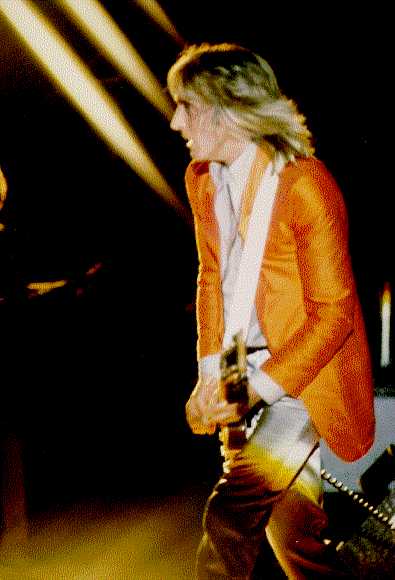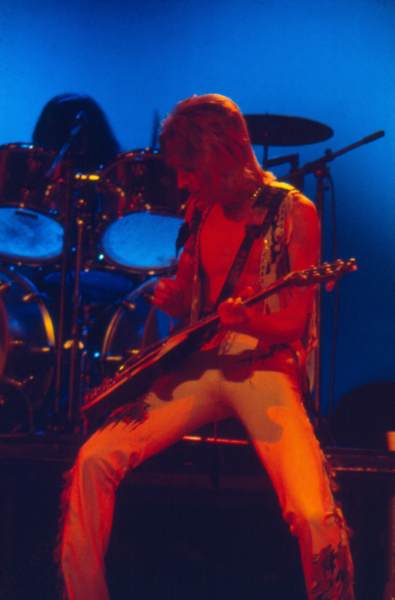Up next, this extremely talented lead guitarist was a major part of David Bowie's sound in his formative years:
Michael "Mick" Ronson was born May 26, 1946 in Hull, East Riding of Yorkshire, England. He was a songwriter, guitarist, multi-instrumentalist, arranger and producer best known for his work with David Bowie.

Ronson was classically trained to play piano, recorder, violin, and later, the harmonium. He had desires to be a cellist but changed to guitar after discovering the music of Duane Eddy. Ronson joined his first group, the Mariners, in 1963 at age 17. Another group from Hull, the Crestas, recruited Ronson and the Crestas began to make regular appearances at local halls.
In 1965, Ronson moved to London, eventually joining the group the Voice. But after a few dates, Ronson returned from a weekend in Hull to find his gear piled up at his home and a note explaining that the rest of the group had gone to The Bahamas. Ronson played briefly with a soul group called the Wanted before returning to Hull. In 1966, Ronson joined the Rats, the top local band at the time. The Rats drew well in their hometown but trips to London and Paris did not go so well.
In March, 1970, Ronson played guitar on the track "Madman Across the Water" while Elton John was recording for his album Tumbleweed Connection. The song featuring Ronson, however, was not included on the original release of the album but rather can be found on the 1992 compilation, Rare Masters.

Ronson was contacted to become a member of a new David Bowie backing band called the Hype. Two days later, Ronson made his debut with Bowie on John Peel's national BBC Radio 1 show. In April, the band began recording the album The Man Who Sold the World. After Bowie's bass guitarist left, Ronson and Bowie took over the arrangements for the album Hunky Dory. The backing band became known as the Spiders From Mars, which was to be the title of Bowie's next album. Ronson provided string arrangements, lead guitar, and various instrumentation on the album, called The Rise and Fall of Ziggy Stardust and the Spiders from Mars. Ronson's work on the album would be a great influence for punk rock musicians later in the Rock Era.

In 1972, Ronson arranged the strings and brass for a song on the album All the Young Dudes for Mott the Hoople, and co-produced Lou Reed's album Transformer. Mick also contributed guitar and vocals and arranged the string ensemble for Pure Prairie League's breakthrough album Bustin' Out. Ronson played on Bowie's Aladdin Sane album in 1973 and the covers album Pin Ups in 1973.
Ronson recorded with Morrissey and played guitar for Van Morrison on tour. After leaving Bowie in 1973, Ronson released three solo albums, his best being his debut--Slaughter on 10th Avenue.
Mick had a short stint with Mott the Hoople and then began a long-time collaborator with the former leader of the group, Ian Hunter. He played guitar on the album Ian Hunter and toured as the Hunter Ronson Band. In 1980, the pair released the live album Welcome to the Club.
Ronson played guitar on John Mellencamp's breakthrough album American Fool, most notably on "Jack & Diane". He also played guitar for David Cassidy and Roger Daltrey, among others.
In 1990, Ronson joined Hunter again on the album Yui Orta, then played guitar on "I Feel Free", a song originally recorded by Cream that Ronson and Bowie had played live 20 years earlier, that is on Bowie's 1993 album Black Tie White Noise.
Ronson's skills were in demand by many artists, including Elton John, John Mellencamp, Morrissey, Benny Mardones. Mick was also a member of Bob Dylan's "Rolling Thunder Revue" live band and contributed guitar and arrangements to Roger McGuinn's 1976 solo album Cardiff Rose.
Ronson played "All the Young Dudes" and "Heroes" for the Freddie Mercury Tribute Concert in 1992 and his final recorded session was for a group called the Wildhearts for their 1993 album Earth vs. the Wildhearts.

Ronson died of liver cancer April 29, 1993 at the age of 46.
#41: Mick Ronson, David Bowie, solo
28 years as an active guitarist
(guitar solo on "Width of a Circle"
(guitar solo on "Width of a Circle"
Michael "Mick" Ronson was born May 26, 1946 in Hull, East Riding of Yorkshire, England. He was a songwriter, guitarist, multi-instrumentalist, arranger and producer best known for his work with David Bowie.

Ronson was classically trained to play piano, recorder, violin, and later, the harmonium. He had desires to be a cellist but changed to guitar after discovering the music of Duane Eddy. Ronson joined his first group, the Mariners, in 1963 at age 17. Another group from Hull, the Crestas, recruited Ronson and the Crestas began to make regular appearances at local halls.
In 1965, Ronson moved to London, eventually joining the group the Voice. But after a few dates, Ronson returned from a weekend in Hull to find his gear piled up at his home and a note explaining that the rest of the group had gone to The Bahamas. Ronson played briefly with a soul group called the Wanted before returning to Hull. In 1966, Ronson joined the Rats, the top local band at the time. The Rats drew well in their hometown but trips to London and Paris did not go so well.
In March, 1970, Ronson played guitar on the track "Madman Across the Water" while Elton John was recording for his album Tumbleweed Connection. The song featuring Ronson, however, was not included on the original release of the album but rather can be found on the 1992 compilation, Rare Masters.

Ronson was contacted to become a member of a new David Bowie backing band called the Hype. Two days later, Ronson made his debut with Bowie on John Peel's national BBC Radio 1 show. In April, the band began recording the album The Man Who Sold the World. After Bowie's bass guitarist left, Ronson and Bowie took over the arrangements for the album Hunky Dory. The backing band became known as the Spiders From Mars, which was to be the title of Bowie's next album. Ronson provided string arrangements, lead guitar, and various instrumentation on the album, called The Rise and Fall of Ziggy Stardust and the Spiders from Mars. Ronson's work on the album would be a great influence for punk rock musicians later in the Rock Era.

In 1972, Ronson arranged the strings and brass for a song on the album All the Young Dudes for Mott the Hoople, and co-produced Lou Reed's album Transformer. Mick also contributed guitar and vocals and arranged the string ensemble for Pure Prairie League's breakthrough album Bustin' Out. Ronson played on Bowie's Aladdin Sane album in 1973 and the covers album Pin Ups in 1973.
Ronson recorded with Morrissey and played guitar for Van Morrison on tour. After leaving Bowie in 1973, Ronson released three solo albums, his best being his debut--Slaughter on 10th Avenue.
Mick had a short stint with Mott the Hoople and then began a long-time collaborator with the former leader of the group, Ian Hunter. He played guitar on the album Ian Hunter and toured as the Hunter Ronson Band. In 1980, the pair released the live album Welcome to the Club.
Ronson played guitar on John Mellencamp's breakthrough album American Fool, most notably on "Jack & Diane". He also played guitar for David Cassidy and Roger Daltrey, among others.
In 1990, Ronson joined Hunter again on the album Yui Orta, then played guitar on "I Feel Free", a song originally recorded by Cream that Ronson and Bowie had played live 20 years earlier, that is on Bowie's 1993 album Black Tie White Noise.
Ronson's skills were in demand by many artists, including Elton John, John Mellencamp, Morrissey, Benny Mardones. Mick was also a member of Bob Dylan's "Rolling Thunder Revue" live band and contributed guitar and arrangements to Roger McGuinn's 1976 solo album Cardiff Rose.
Ronson played "All the Young Dudes" and "Heroes" for the Freddie Mercury Tribute Concert in 1992 and his final recorded session was for a group called the Wildhearts for their 1993 album Earth vs. the Wildhearts.

Ronson died of liver cancer April 29, 1993 at the age of 46.
Heaven and Huh had only been partially completed before Ronson's death and was released posthumously. Mellencamp, Bowie, Chrissie Hynde and Martin Chambers of the Pretenders, Joe Elliott of Def Leppard and Ian Hunter all helped with the album.
The Mick Ronson Memorial Stage was constructed in Queens Gardens in his hometown of Hull. There is also a street named after him on Bilton Grange Estate, not far from where he lived.
Ronson used a 1968 Gibson Les Paul Custom "Black Beauty" throughout his career with Bowie and afterwards. At some point in the 1980's, Ronson switched to a rosewood fretboard Fender Telecaster. Mick used Marshall 200 amplifiers and also owned one of the first Mesa-Boogie amps. Ronson used a Crybaby Wah Pedal and a Sola Sound Tone Blender.

Ronson had the speed, the technique and a melodic sense. He is The #41 Guitarist of the Rock Era*...
The Mick Ronson Memorial Stage was constructed in Queens Gardens in his hometown of Hull. There is also a street named after him on Bilton Grange Estate, not far from where he lived.
Ronson used a 1968 Gibson Les Paul Custom "Black Beauty" throughout his career with Bowie and afterwards. At some point in the 1980's, Ronson switched to a rosewood fretboard Fender Telecaster. Mick used Marshall 200 amplifiers and also owned one of the first Mesa-Boogie amps. Ronson used a Crybaby Wah Pedal and a Sola Sound Tone Blender.

Ronson had the speed, the technique and a melodic sense. He is The #41 Guitarist of the Rock Era*...
No comments:
Post a Comment
Note: Only a member of this blog may post a comment.